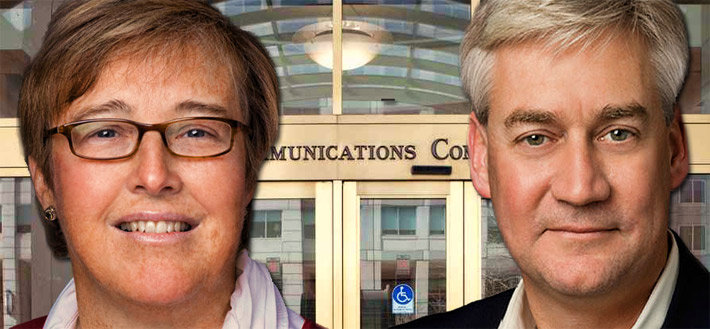
Kathleen Ham, Senior VP, Government Affairs for T-Mobile and Steve Sharkey, Government Affairs, Technology and Engineering Policy VP are FCC ‘Eighth-Floor’ insiders, having served for many years in leadership positions at the agency.
T-Mobile is petitioning the FCC for confirmation that its proposed merger with Sprint won’t prevent the carrier from bidding in wireless spectrum auctions under FCC rules prohibiting joint-bidding arrangements between companies, according to an ex parte filing this week.
Kathleen Ham, Senior VP, Government Affairs for T-Mobile and Steve Sharkey, the carrier’s Government Affairs, Technology and Engineering Policy chief, and their attorneys, sought assurances from FCC Commissioner Brendan Carr and other FCC staffers that pending merger agreements, such as its business combination agreement (BCA) with Sprint, “are not a joint-bidding arrangement within the meaning of Commission rules”.
In meeting with Carr and numerous FCC bureau chiefs and legal advisors on July 19 and 20, T-Mobile outlined why they believe there is no conflict with their bidding in the upcoming auctions 101 (28 GHz) and 102 (24 GHz) if they did not collude with Sprint, directly or indirectly, regarding specific prices to be bid, bidding strategies, or post-auction market structure.
T-Mobile is seeking confirmation that agreements that do not address or communicate bids or bidding strategy are not joint-bidding agreements.
In their filing, T-Mobile said: “An agreement to merge two companies with a combined enterprise value of approximately $146 billion and a broad and diverse set of network, retail, service and spectrum assets does not ‘relate to the licenses being auctioned.’ T-Mobile and Sprint did not enter into the BCA to effect a change in control of licenses that the Commission would subsequently identify for competitive bidding in Auctions 101 and 102.”
T-Mobile emphasized that “broad auction participation is a prerequisite to satisfying the Commission’s directives to promote economic opportunity and competition, and to ensure the public recovers a portion of the value of public spectrum made available for commercial use.”
T-Mobile sends in the A-Team
Ham and Sharkey fully understand the inner workings of the FCC, knowing how to navigate the corridors to get to the vaulted “Eighth-Floor”.
Prior to joining T-Mobile in 2004, Ham worked at the FCC in key positions, including Deputy Chief of the Wireless Telecommunications Bureau. She was also the first Chief of the FCC’s Spectrum Auctions Program where she was in charge of the early landmark PCS spectrum auctions.
Sharkey also served in a variety of roles at the FCC, including in the Office of Engineering and Technology. He continued to interface with agency heads when he served as Senior Director, Regulatory and Spectrum Policy in Motorola’s Global Government Affairs office in Washington, D.C.

















